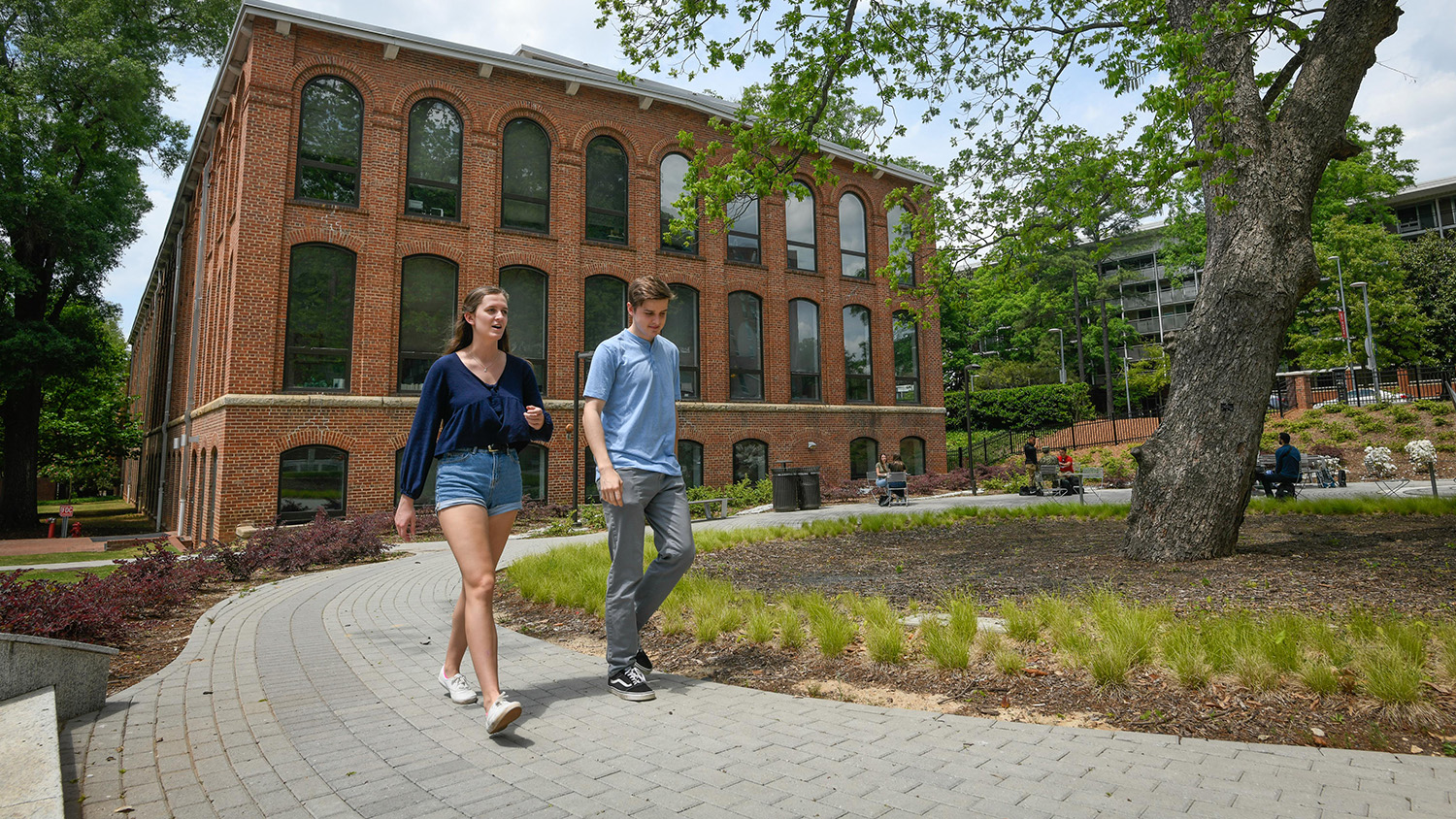Major in Science, Technology and Society (STS)

Degree Requirements
Students pursue either a Bachelor of Arts (B.A.) or Bachelor of Science (B.S.) degree. Both degrees require the following curriculum.
Core Courses
- STS 214: Introduction to Science, Technology, and Society
- STS 403: Capstone Course and Seminar in Science, Technology, and Society
Specialty
Design a personal STS specialty course cluster of 15 credit hours (usually five courses) addressing a specific theme related to science, technology and society. See below for more details.
Breadth Groups (12 total credit hours)
Choose one course from each of four STS breadth groups:
- History in a STS-related area
- Philosophy of science and ethics
- Assessment and policy in a STS-related area
- Other STS-related courses
Technical Writing and Communication Requirement
- ENG 331, 332 or 333
Bachelor of Arts (B.A.)
The B.A. degree includes more courses in the humanities and social sciences. In addition to the core curriculum, students must complete:
- An approved statistics course.
- Complete additional Humanities and Social Sciences, General Education Program and foreign language requirements.
Bachelor of Science (B.S.)
The B.S. degree includes more courses in mathematics and the natural sciences. In addition to the core curriculum, students must complete:
- An approved statistics course.
- An Advanced Science/Technology Requirement of 15 credit hours, which you may pursue as an academic minor. View the B.S. Advanced Science/Technology form for additional information and instructions.
- Elective courses. The B.S. includes fewer free electives than the B.A. due to the Advanced Science/Technology Requirement.
How to Add or Change A Major

Specialty Requirement
Working with the program director or an academic advisor, our students design their own degree specializations. Each specialty must include 15 credit hours, or usually five courses.
Specialty Examples
The listed specialties are intended only as examples; students may propose specialties and courses beyond those listed. The selected courses need not be included in the list of Breadth Requirements, but should have a reasonable connection to STS (e.g. PSY 340 – Ergonomics) or the chosen specialty. Students are responsible for meeting all course prerequisites. The specialty and list of courses selected by the student are subject to approval by the Program Director or the student’s STS advisor.
Environmental Studies
- NR/IDS 303: Humans and the Environment – recommended
- COM 436: Environmental Communication
- HI 440: American Environmental History
- IDS 201: Enviromental Ethics
- PHI 422: Philosophical Issues in Environmental Ethics
- PS 320: U.S. Environmental Law and Politics
- PS 336: Global Environmental Politics
- SOC 450: Environmental Sociology
Biomedical
- STS/PHI 325: Biomedical Ethics – recommended
- ENG 232: Literature and Medicine
- GN 301: Genetics in Human Affairs
- HI 481: History of the Life Sciences
- PHI 415: Life Science Ethics
- SOC 381: Sociology of Medicine
Engineering Ethics
- STS 320: Ethics in Engineering – recommended
- HI 485: History of American Technology
- HI 341: Technology in History
- PHI 314: Issues in Business Ethics
- PHI 422: Philosophical Issues in Environmental Ethics
- STS 322: Technological Catastrophes
- STS 326: Technology Assessment*
- STS 304: Ethical Dimensions of Progress
*Benjamin Franklin Scholars may substitute E 497B: Franklin Scholars Capstone for STS 326
History of Science and Technology
Recommended – Take at least one of the following:
- HI 321: Ancient & Medieval Science
- HI 322: Rise of Modern Science
- HI 341: Technology in History
Other courses:
- HI 480: Scientific Revolution: 1300-1700
- HI 440: American Environmental History
- HI 481: History of the Life Sciences
- HI 482: Darwinism in Science & Society
- HI 483: Science and Religion In European History
- HI 484: Science in European Culture
- HI 485: History of American Technology
Information and Communication Technology
- CSC/BUS 340: Information System Management
- COM 447: Communication and Globalization
- COM 487: Internet and Society
- STS 320: Engineering Ethics (3 crs) and CSC 379: Ethics in Computing (1 cr)
Philosophy of Science
- LOG 201: Logic – recommended
- PHI 340: Philosophy of Science – recommended
- PHI 440: The Scientific Method – recommended
- HI 480: Scientific Revolution: 1300-1700
- HI 481: History of the Life Sciences
Science and Technology Policy
- PS 314: Science, Technology, and Public Policy – recommended
- PS 320: U.S. Environmental Law and Politic
- PS 336: Global Environmental Politics
- STS 320: Ethics in Engineering
- STS 322: Technological Catastrophes
- STS 326: Technology Assessment*
- STS 402: Peace and War in the Nuclear Age
*Benjamin Franklin Scholars may substitute E 497B: Franklin Scholars Capstone for STS 326
Science, Technology, and International Affairs
- COM 447: Communication and Globalization
- FLS 212: Spanish: Language, Technology, Culture
- HI 483: Science and Religion In European History
- HI 484: Science in European Culture
- PHI 420: Global Justice
- PS 336: Global Environmental Politics
- PS 339: Politics of the World Economy
- STS 322: Technological Catastrophes
- STS 323: World Population and Food Prospects
- STS 484: Cross Cultural Technology Transfer
- STS 402: Peace and War in the Nuclear Age
Scientific and Technical and Writing
Recommended – Take four courses from the following list, including at least one at the 400-level or above and at least one of 215, 315, or 520 and at least one of 314 and 317:
- ENG 215: Principles of News and Article Writing
- ENG 314: Technical Document Design and Editing
- ENG 315: Advanced News and Article Writing
- ENG 317: Designing Web Communication
- ENG 425: Analysis of Scientific and Technical Writing
- ENG 520: Science Writing for the Media (with instructor permission)
How to Build a Specialty
- After being admitted to the program, students meet with an academic advisor to discuss and approve a specialty title and course selection.
- Students may not have advising holds released until the specialty form (and, for B.S. majors, the Advanced Science/Technology Requirement form) is/are fully approved and signed.
- The specialty requires a minimum of 15 credit hours. At least two of the Specialty courses must be from humanities and social sciences disciplines.
- The specialty includes courses typically at the 300 and 400 levels and no more than one course at the 200 level. The Specialty should not include 100-level courses.
- Each specialty course must earn a grade of C- or higher.